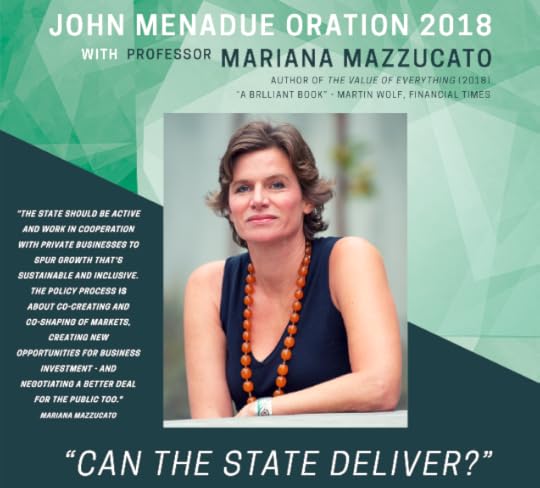Centre for Policy Development's Blog, page 28
December 19, 2018
Second Meeting | Council on Economic Participation for Refugees | September 2018
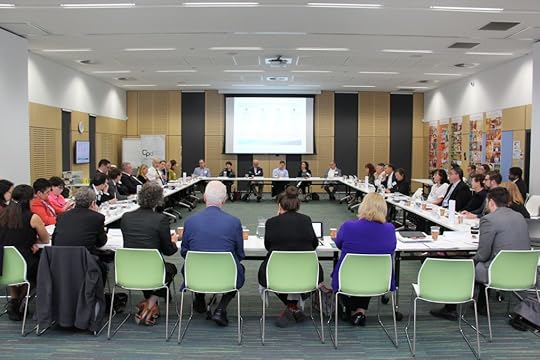
Key documents:
Agenda
Participants list
Briefing material
Meeting summary
The second meeting of the Council on Economic Participation for Refugees was held in Fairfield, NSW on 12/13 September 2018. Fairfield is a primary settlement location for a large number of refugees each year and is home to a significant number of services and initiatives which aim to help refugees settle quickly and integrate fully into Australian life. We were pleased to hold our second Council meeting in Fairfield with the help of the Fairfield City Council and local service providers.
The objectives of the second Council meeting were to:
Develop a more detailed vision for a place-based approach to refugee settlement and economic participation
Explore how the review of Australian employment services might result in new approaches to better support refugee job seekers, including through the use of place-based approaches
Hear from a number of leading Australian employers as to how they are approaching the recruitment and retention of refugee job seekers
Understand the additional challenges often faced by refugee women with respect to economic participation and how these might be overcome
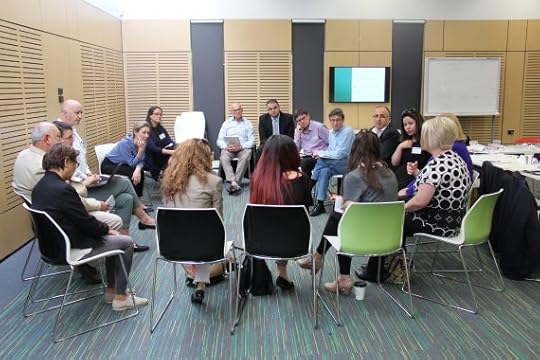
The post Second Meeting | Council on Economic Participation for Refugees | September 2018 appeared first on Centre for Policy Development.
Council on Economic Participation for Refugees
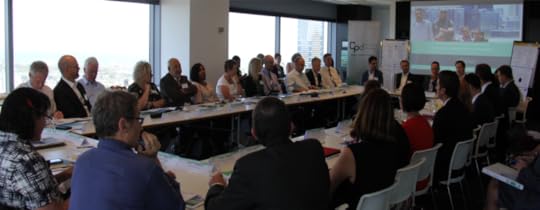
On 22 February 2018, CPD convened the first meeting of the Council on Economic Participation for Refugees (the Council), hosted by the Boston Consulting Group in Melbourne.
The Council is the first pillar of CPD’s new Cities and Settlement Initiative (CSI).
The Council brings together key federal and state government officials with service providers, employers, international experts and the metropolitan and regional cities that are settling the most refugees. We are focused on building integrated service delivery to improve the economic participation of refugees.
To read more about the second meeting in Fairfield in September 2018 click here.
To read more about the first meeting in Melbourne in February 2018 click here.
The post Council on Economic Participation for Refugees appeared first on Centre for Policy Development.
December 6, 2018
Mariana Mazzucato delivered CPD’s John Menadue Oration | December 2018
Professor Mariana Mazzucato, one of the world’s most influential and forward-thinking economists, visited Australia as a guest of the Centre for Policy Development in December 2018. As part of her visit, Professor Mazzucato delivered the second annual John Menadue Oration on 11 December at Carriageworks in Sydney. Slides from the Menadue Oration are available here. A full summary of Mariana’s visit, including video, audio, photos and relevant transcripts will be available on this website in due course.
Coverage and related media
Are we overlooking the role of the public sector in the economy, Interview with Laura Tingle for ABC 730 program, 10 December 2018.
On a mission: saving democracy, Travers McLeod, Sam Hurley and Allison Orr, Inside Story, 6 December 2018
When banks disappoint, let the state step up: contrarian economist Mariana Mazzucato, Hans van Leeuwen, Australian Financial Review, 7 December 2018
Mariana Mazzucato discusses how to improve our economy, Geraldine Doogue, ABC’s Saturday Extra, 8 December 2018
Innovate before it is too late, warms economist Mariana Mazzucato, Company Director Magazine, 1 December 2018.
Background on Mariana Mazzucato
Mariana is the author of a trio of best-selling books that call for a more dynamic public sector and a better understanding of what truly creates value in our economies – and what destroys it. Her work makes a powerful case that governments have stepped back from their critical role driving technological innovation and targeting a direction, as well as a rate, for economic growth. It also highlights the dangers of conflating value-creating activities with value-extraction – especially in a financial sector that focuses on maximising near-term returns for shareholders at the expense of long-term social value.
Mariana is the founder and director of the University College of London’s Institute for Innovation and Public Purpose, which aims to train and inspire the next generation of global leaders to tackle mission-oriented societal goals around issues like climate change and inequality. She’s also an expert advisor to policymakers, governments and institutions around the world. You can read her full bio here.
CPD was delighted to bring Mariana’s expertise, insights and ideas to Australia for the first time. Her visit came at a unique and important moment in Australian politics and policy. The Thodey review of the Australian Public Service and the Financial System Royal Commission are considering new ways to make our public and private sectors fit-for-purpose in the 21st century. Revolving-door leadership in Canberra and a worrying decline in Australian’s faith in their system of government do deliver means that big ideas for rebuilding effective and trusted government, public policy and business are more important than ever.
Public events
Public address: Rethinking innovation policy, Sydney, Monday 10 December (sold out)
Co-hosted by CPD and UTS
UTS, 5:30pm-7:30pm
CPD 2018 John Menadue Oration: Can the State Deliver? Sydney, Tuesday 11 December
Keynote address by Mariana Mazzucato followed by a panel discussion with Laura Tingle and Glyn Davis AC
Hosted by the Centre for Policy Development
Carriageworks, Sydney 5:30pm-730pm. RSVP for free here.
Public forum – Innovation & Cities Melbourne, Thursday 13 December
Co-hosted by CPD, the City of Melbourne and Monash Sustainable Development Institute
Featuring Mariana Mazzucato in conversation with Glyn Davis AC, Sarah Person and John Thwaites
The Wheeler Centre, Melbourne 12:30pm. RSVP for free here.
Foundation for Young Australia’s Breakfast, Melbourne Friday 14 December
FYA Hub 8:00am-9:30am. RSVP for free here.
CEDA lunch – Rethinking Business, Melbourne, Friday 14 December 18
Co-hosted by CPD, CEDA and Monash University
Featuring Mariana Mazzucato, Clare O’Neil MP, Sam Mostyn and Melinda Cilento
Sofitel Melbourne, 11:45am-2:00pm. Tickets available here.
Related reading
Freakonomics podcast with Mariana Mazzucato.
Mission-Oriented Research & Innovation in the European Union: A problem-solving approach to fuel innovation-led growth, Mariana Mazzucato.
The post Mariana Mazzucato delivered CPD’s John Menadue Oration | December 2018 appeared first on Centre for Policy Development.
Mariana Mazzucato to deliver CPD John Menadue Oration
You can register for the Oration here.
Next week the brilliant Professor Mariana Mazzucato, one of the world’s most influential and forward-thinking economists, will be visiting Australia as a guest of the Centre for Policy Development.
Mariana is the author of a trio of best-selling books that call for a more dynamic public sector and a better understanding of what truly creates value in our economies – and what destroys it. Her work makes a powerful case that governments have stepped back from their critical role driving technological innovation and targeting a direction, as well as a rate, for economic growth. It also highlights the dangers of conflating value-creating activities with value-extraction – especially in a financial sector that focuses on maximising near-term returns for shareholders at the expense of long-term social value.
Mariana is the founder and director of the University College of London’s Institute for Innovation and Public Purpose, which aims to train and inspire the next generation of global leaders to tackle mission-oriented societal goals around issues like climate change and inequality. She’s also an expert advisor to policymakers, governments and institutions around the world. You can read her full bio here.
We are delighted to be bringing Mariana’s expertise, insights and ideas to Australia for the first time. Her visit comes at a unique and important time in Australian politics and policy. The Thodey review of the Australian Public Service and the Financial System Royal Commission are considering new ways to make our public and private sectors fit-for-purpose in the 21st century. And revolving-door leadership in Canberra – and a worrying decline in Australian’s faith in their system of government do deliver – mean that big ideas for rebuilding effective and trusted government, public policy and business are more important than ever.
If you would like to hear from Mariana in person, we have good news – you can reserve your tickets to public events in Sydney and Melbourne below. Mariana will also be talking with leading Australian policymakers, researchers and journalists during her visit. We will update this page with updates and links to media coverage of Mariana’s visit, so check back here during the week to stay in touch with the latest, or follow on Twitter through the hashtags #mazzucato and #publicvalue.
In the meantime, below you can view Mariana’s 2013 TED Talk from for a snapshot of her ideas – and visit her website to read more about her research and policy work.
Coverage and related media
On a mission: saving democracy, Travers McLeod, Sam Hurley and Allison Orr, Inside Story, 6 December 2018
Innovate before it is too late, warms economist Mariana Mazzucato, Company Director Magazine, 1 December 2018.
Public events
Public address: Rethinking innovation policy, Sydney, Monday 10 December (sold out)
Co-hosted by CPD and UTS
UTS, 5:30pm-7:30pm
CPD 2018 John Menadue Oration: Can the State Deliver? Sydney, Tuesday 11 December
Keynote address by Mariana Mazzucato followed by a panel discussion with Laura Tingle and Glyn Davis AC
Hosted by the Centre for Policy Development
Carriageworks, Sydney 5:30pm-730pm. RSVP for free here.
Public forum – Innovation & Cities Melbourne, Thursday 13 December
Co-hosted by CPD, the City of Melbourne and Monash Sustainable Development Institute
Featuring Mariana Mazzucato in conversation with Glyn Davis AC, Sarah Person and John Thwaites
The Wheeler Centre, Melbourne 12:30pm. RSVP for free here.
Foundation for Young Australia’s Breakfast, Melbourne Friday 14 December
FYA Hub 8:00am-9:30am. RSVP for free here.
CEDA lunch – Rethinking Business, Melbourne, Friday 14 December 18
Co-hosted by CPD, CEDA and Monash University
Featuring Mariana Mazzucato, Clare O’Neil MP, Sam Mostyn and Melinda Cilento
Sofitel Melbourne, 11:45am-2:00pm. Tickets available here.
Related reading
Freakonomics podcast with Mariana Mazzucato.
Mission-Oriented Research & Innovation in the European Union: A problem-solving approach to fuel innovation-led growth, Mariana Mazzucato.
The post Mariana Mazzucato to deliver CPD John Menadue Oration appeared first on Centre for Policy Development.
December 3, 2018
RSVP: John Menadue Oration by Professor Mariana Mazzucato: Can the State Deliver? 11 December Sydney
The post RSVP: John Menadue Oration by Professor Mariana Mazzucato: Can the State Deliver? 11 December Sydney appeared first on Centre for Policy Development.
December 2, 2018
Cities and Settlement Initiative
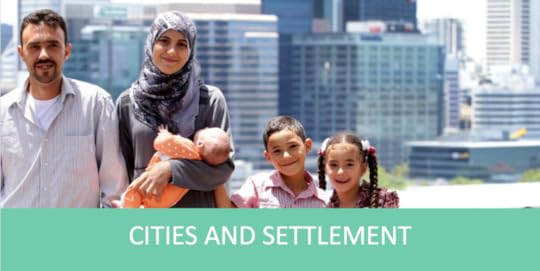
In 2018 CPD launched our Cities and Settlement Initiative – a three-year program that aims to improve the economic participation of refugees in Australia. Below we chart the background, current evidence, the three pillars of the initiative, and our current work program.
For more information, please contact CPD Senior Project Manager, Lisa Button.
Background
Refugees are a central part of Australia’s history.
Since the end of World War II, successive governments have helped more than 800,000 refugees and displaced people of different nationalities and faiths to build new lives in Australia. Ensuring their successful integration has been vital to building a prosperous, welcoming and proudly multicultural Australia. The contribution of refugees and their families to Australia has been enormously positive. They are Australia’s most resilient and entrepreneurial migrants.
But there is currently a weak link in Australia’s settlement record – refugees experience great difficulty in finding work or starting a business, particularly in their early years of settlement. We know sustainable economic participation is the bedrock for successful settlement. This is where Australia is falling behind, and the challenge we must address to settle refugees better.
Economic participation
The current numbers on refugee economic participation tell a worrying story:
Refugees have 2.9 times higher unemployment (25%) and only 0.8 times the participation rate (48%) than the overall population
These challenges are much worse for recent arrivals – the BNLA longitudinal dataset found that after 36 months in Australia, just 21% of refugees arriving are in paid work
This is driven by 4 key challenges:
Limited English skills: 32% of HMs have limited English skills, and their participation rate (27%) is half that of those with English proficiency (59%)
Challenges using previous qualifications: while 27% have a Bachelor or Postgraduate degree, only 12% of those working are in occupations needing a university degree, and 31% are in jobs needing High school or lower
Additional barriers for women: female humanitarian migrants have 0.6x the participation and 1.3x the unemployment rates as men
Lack of prior work experience: The BNLA longitudinal dataset found 44% of adult refugees had limited/no work experience before arriving to Australia, and this cohort were 40% less likely to be in paid work after 18 months in Australia
On top of these challenges, there are systemic challenges to the support programs. There are many programs and services, but efforts are often not unified and co-ordinated. Within the Australian federal government, there are at least three Departments with responsibility for the core services vital to refugee settlement, often with different or non-aligned policy objectives or frameworks.
In 2017, the Centre for Policy Development published the Settling Better report, with the support of a small team of volunteers from the Boston Consulting Group. Settling Better outlined the challenges above and offered a set of practical recommendations.
There is a big prize on the table if we can settle refugees better. A 25% improvement in outcomes for just one annual intake is worth $460m in direct value to those refugees and $175m in savings to the Federal Government over ten years, not to mention the significant social and community dividends.
This is the vision that the Cities and Settlement Initiative is designed to deliver.
Three Pillars
Since Settling Better was released, CPD has been working with a wide group of stakeholders through its Cities and Settlement Initiative to refine and further develop ideas to improve policy and programming.
The Cities and Settlement Initiative has three main components:
The Council on Economic Participation for Refugees: This Council seeks to recharge governance on refugee employment and settlement by bringing together all levels of government, injecting fresh insights from cities, settlement service providers and civil society, and providing a clear purpose to align their efforts: economic participation.
A knowledge hub on best practice: This hub seeks to provide better evidence about what works, by carefully evaluating the most promising practices and policy measures to get refugees into appropriate jobs faster, and making this information available to governments and settlement service providers.
An innovation network on social and civic engagement: Local initiatives, which bolster social networks and lift civic engagement of refugees are often siloed, unknown, and struggle to attract money. This network seeks to identify creative programs at a grassroots level, evaluate selected programs, then leverage resources in the start-up community and government to find a path for growth and replication of successful programs.
The Cities and Settlement Initiative is focussing these efforts in the places that need them the most: the local government areas settling the most refugees. Many of these, like Fairfield in Western Sydney, or Greater Dandenong and Hume on the outskirts of Melbourne, must be exemplars at settlement refugee participation if Australia as a whole is to rise to this challenge. Boosting policy memory, capability and co-ordination across local governments, and their connections to state and federal counterparts, is a critical piece of this puzzle.
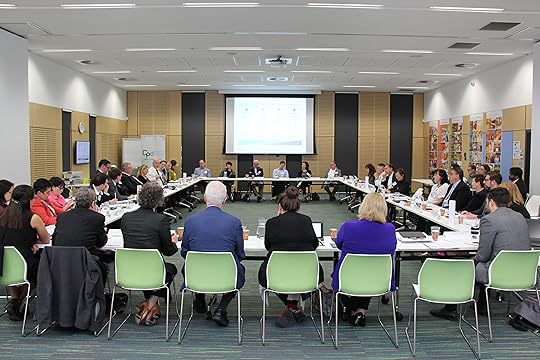
Photo: The second meeting of the Council on Economic Participation for Refugees, in Fairfield NSW.
Work program
We are now pursuing proposals in three areas that we believe are critical to improving refugee economic participation outcomes:
1.Reforming service and funding models
Some of the current approaches to employment, language and settlement services have passed their use by date. Consensus is growing for bold reforms ahead of new employment and language services systems taking effect nationally in July 2020. Central to this endeavour is a new, place-based approach to delivering these services that focusses resources on the people and places that need them most. Empowering key stakeholders at a local level to provide integrated support for refugees, relevant to the local context — like language, networks, pre-employment skills and employment services — could have a huge impact on their ability to find jobs or start businesses in their communities.
Federal employment services and a place-based approach
To accelerate a move toward place-based approaches, we made comprehensive recommendations to the national employment services review. We argued the new system should equip the workforce for the future, meet the needs of women more effectively, prioritise pathways to sustainable employment, engage more employers, and focus resources on the people and places that need them most. Chief among our recommendations was overcoming a plethora of employment programs and initiatives at local level that lack a unity of focus and a common funding pool. We sought bespoke and individualised employment services, particularly given that many refugees present with multiple barriers to employment.
We are now working to facilitate trials of a new, place-based approach in high settlement areas, especially for employment services. This more tailored approach is best developed and delivered by local organisations which are closer to the job market, including direct delivery or brokering by local government. These trials will work with a cohort of refugees, asylum seekers, and those from refugee backgrounds. Their objective will be to support individuals and their families within that cohort to achieve enhanced economic participation. The trial will seek to unify the efforts of all players within a local government area and empower them to offer comprehensive and integrated services to the individual or family unit. It will involve tailored employment-related services — drawing on and channelling federal, state and local funding — and be coordinated with related service offerings such as language training and active brokering with local employers. It will also incorporate important job-readiness supports such as qualification and skills recognition.
Goal: Develop a framework for a placed-based approach to boosting refugee economic participation for general application and work with local government in key areas, such as the City of Wyndham, to test and trial this framework.
Improving language services
The language services currently offered through the AMEP program have many challenges; they are not well co-ordinated with other services, and refugees often need to discontinue when they get their first job, locking them into economic disadvantage.
A number of potential solutions are currently being assessed, including: integrating work and ongoing language education, greater integration between language education and employment services, greater flexibility with respect to modes of delivery of English language education.
Goal: Identify areas in which current language services could be improved and effectively engage relevant policy makers in addressing these.
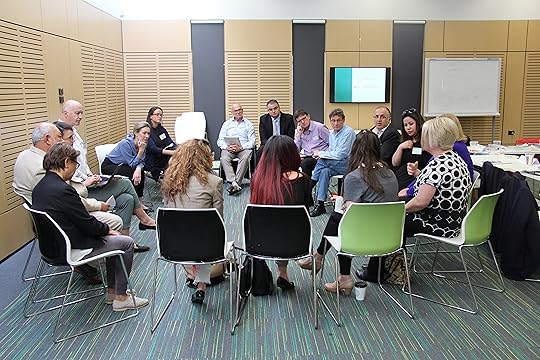
Photo: A working group discussion on refugee women’s economic participation during the second meeting of the Council on Economic Participation for Refugees, in Fairfield NSW.
2.Identifying and investing in promising practices
There are several promising practices at home and abroad we have suggested could be better leveraged, such as community sponsorship of refugees and faster recognition and utilisation of refugees’ existing skills. The following are some of the practices we think are ‘underdone’ in Australia.
Engaging employers
While there are supports and services available to help match Australian employers with refugee jobseekers, smaller employers with less corporate resources find it difficult to navigate them. A number of potential solutions are being assessed, including a “broker” model to support smaller employers to use the available services.
There may also be opportunities to more effectively encourage and support medium and large employers to establish or expand their humanitarian migrant employment programs, including through social policy responses and place-based initiatives.
Goal for initiative: understand employer needs through targeted research and develop proposals for new policy approaches and other measures to address these needs, with a view to expanding employer engagement.
Building entrepreneurship
In 2017, refugees reported 14% of their income from their own business; while this could be a large opportunity to drive further economic integration, there is currently little policy support and only small or unsuitable programs in the space
Goal for initiative: undertake research on Australian and overseas experiences to identify public policy options and practical measures for boosting refugee entrepreneurship.
Minimising gender barriers
Women are four times more likely to not have a job after 18 months in Australia compared to men. Programs such as Community Hubs have been directly targeting refugee women, but there may be opportunities to further scale.
Goal for initiative: Put in place expertise and structures to ensure that a gender lens is effectively employed in all streams of work.
3.Encouraging a centre of gravity in government
To bring these proposals together and give them every chance of success, there is also an opportunity to create a centre of gravity for settlement services within the Australian government. This could be done by centralising post-arrival humanitarian and settlement policy within a single or smaller number of Commonwealth Departments. Currently, services specifically designed to support refugees and other migrants on arrival in Australia are managed by at least three separate Commonwealth Departments, often with uncoordinated objectives and disconnected service delivery approaches. It is imperative that machinery of government arrangements in Canberra finalised after the next Federal Election encourage unity of effort and funding nationally, and in turn empower place-based approaches owned and operated by local communities.
Goal for initiative: work closely with government and non-government stakeholders to identify and promote machinery of government changes that would result in more coordinated and effective settlement services for refugees
Next Steps
The Council for Economic Participation for Refugees will next meet in March/April 2019.
You can read key more information about CPD’s settlement related research below. We look forward to keeping you updated as we deliver this exciting initiative.
CSI is supported by the Myer Foundation, the Vincent Fairfax Family Foundation and the Cameron Foundation and by a small team of volunteers at the Boston Consulting Group.
Key documents
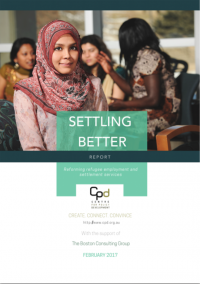
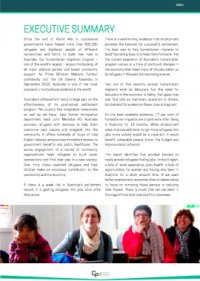
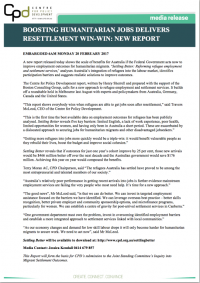
Full report
Executive summary and foreword
Media release
Media
Helping refugees build new lives: Q&A with Peter Shergold, The Mandarin, 15.03.2018
‘The catch-22’: refugees to Australia struggle to find work, The Guardian, Ben Doherty, 20.03.2018.
How to better help refugees and asylum seekers enter the workforce, ABC Radio, Amand Smith, 12.12.2017.
Boosting Refugee Jobs Would Be A Win-Win For Australia, The Huffington Post, Henry Sherrell and Travers McLeod, 24.02.2017.
Finding jobs faster for new refugees a ‘triple win’ for Australia, report finds, The Guardian, Ben Doherty, 21.02.2017.
We’ve lost the knack of finding jobs for refugees, The Australian, Terry Moran and Larry Kamener, 20.02.2017.
AMP, Harvey Norman, Woolworths and Telstra back refugee jobs plan, Australian Financial Review, Laura Tingle, 19.02.2017.
Refugee settlement government has ‘no centre of gravity’, The Mandarin, David Donaldson, 20.02.2017.
Related reading:
A Significant Contribution: The Economic, Social and Civic Contributions of First and Second Generation Humanitarian Entrants, Department of Immigration and Citizenship, 2011.
Building a New Life in Australia: The Longitudinal Study of Humanitarian Migrants, Department of Social Services, 2015.
References
Based on employment status on census night 2016. Refugee data is from tfrom ACMID: Australian Census and Migrants Integrated Dataset, covering the ~182k humanitarian migrants aged 15+ on census night. Population data is based on the 2016 Australian Census.
BNLA: Building a New Life in Australia dataset is based on ~1,700 humanitarian migrants who settled in 2013
ACMID (ibid.)
ACMID (ibid)
ACMID (ibid)
BNLA (ibid)
BCG Analysis. Employment gap from 2016 Census (ibid) and ACMID (ibid.). Income gap taken from ABS Average Weekly Earnings survey and ABS PITMID: Personal Income Tax and Migrants Integrated Dataset. Program costs based on Australian government budget for Syrian refugee intake and Centrelink payments. Humanitarian Migrant Intake size taken from Department of Home Affairs planned figures for 2018-19. Welfare costs based on Productivity Commission inquiry into the migrant intake. All figures indexed to 2018-19 prices using RBA reported Consumer Price Index. Discount rate from Productivity Commission cost-benefit analysis guidance.
The post Cities and Settlement Initiative appeared first on Centre for Policy Development.
November 28, 2018
RSVP: John Menadue Oration by Professor Mariana Mazzucato: Can the State Deliver? 11 December Sydney
The post RSVP: John Menadue Oration by Professor Mariana Mazzucato: Can the State Deliver? 11 December Sydney appeared first on Centre for Policy Development.
November 26, 2018
Seventh meeting | ASIA DIALOGUE ON FORCED MIGRATION | November 2018
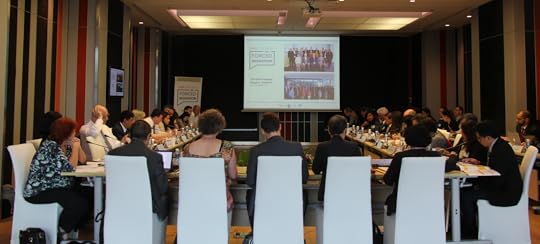
Key documents for the seventh ADFM meeting:
Full agenda and participant list
Participant profiles
Related media
The seventh meeting of the Asia Dialogue on Forced Migration (ADFM) was held from 18-20 November 2018 in Bangkok, Thailand, following the recently concluded 33rdASEAN Summit in Singapore. At its seventh meeting, the ADFM focussed on the risks of human trafficking, migrant smuggling and related exploitation arising from the displacement of the Rohingya in Myanmar and Bangladesh; coordinated regional responses to migrants at risk; and good practice alternatives to child detention.
Since its sixth meeting in Sydney in March 2018, the ADFM Secretariat has had a productive period. Following visits to Jakarta and Geneva, the Secretariat presented to the Bali Process Ad Hoc Group Senior Officials’ Meeting in June, and to the Ministerial Conference and Senior Officials’ Meeting in August 2018. The Secretariat has also conducted an assessment of the risk of human trafficking, migrant smuggling and related exploitation arising from the situation in Cox’s Bazar, sharing preliminary findings of the assessment with ADFM members in Bangkok.
ADFM members commended Bangladesh and its international partners for their generous and effective humanitarian response to the crisis and acknowledged that the most durable answer to the situation is the safe, dignified, voluntary and sustainable repatriation of the Rohingya to Rakhine State in Myanmar. ADFM members also noted with concern the current and intensifying risks of both people displaced and Bangladeshi nationals becoming victims of trafficking, smuggling and exploitation.
ADFM members agreed there is much regional actors can do in response to the risk scenarios: from boosting capacity of actors on the ground in Bangladesh and Myanmar to prevent and counter human trafficking; to targeted development assistance on both sides of the Naf River, benefitting local, displaced and refugee populations, to address risk factors and assist people to prepare for eventual return and sustainable repatriation.
ADFM members recognised the important roles that ASEAN and the Bali Process play in managing migration in the region, particularly in countering trafficking in persons, forced labour and modern slavery. The ADFM noted there is scope for the two bodies to work more closely together to assist their member states in responding to shared migration challenges and implementing key elements of the Global Compacts on Migration and Refugees.
The news that Australia would not be signing the Global Compact on Migration in December broke shortly after the seventh ADFM meeting concluded, and was met with disappointment by the ADFM Secretariat. Here is an opinion piece published by Travers McLeod, Chief Executive Officer of the Centre for Policy Development and ADFM co-convenor, on the decision.
The third major topic covered at the seventh ADFM meeting was alternatives to the detention of children in the context of international migration. ADFM members discussed the steps several countries in the region are taking to phase out child detention, including in Thailand, Indonesia and Malaysia, and resolved to convene a workshop of interested countries, institutions, civil society and faith-based organisations to share the ‘how to’ of effective alternatives to child detention.
The ADFM Secretariat will also look to take forward other proposals raised at the seventh meeting with regional actors, including: sharing the findings of the Cox’s Bazar trafficking risk assessment with relevant regional bodies; offering assistance to ASEAN and the ASEAN Coordinating Centre for Humanitarian Assistance on Disaster Management (AHA Centre) in their continuing management of migrants at risk; investigating possible further support for the displaced populations in Myanmar and Bangladesh through an international conference; and contributing to regional dialogue on the modalities for greater ASEAN and Bali Process collaboration.
The ADFM Co-chairs thank the Institute for Human Rights and Peace Studies and Mahidol University for their support in convening the seventh meeting in Bangkok. The ADFM has met twice a year since August 2015 and meetings have been held in Melbourne, Bangkok, Jakarta, Kuala Lumpur, Manila and Sydney. The next meeting is scheduled to be in Jakarta, Indonesia in mid-2019.
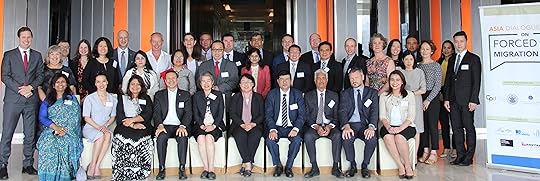
Background reading:
For the ADFM home page click here.
To find out more about the rationale behind the ADFM click here.
To read more about the first ADFM meeting in Melbourne in August 2015 click here.
To read more about the second ADFM meeting in Bangkok in January 2016 click here.
To read more about the third ADFM meeting in Kuala Lumpur in September 2016 click here.
To read more about the fourth ADFM meeting in Jakarta in March 2017 click here.
To read more about the fifth ADFM meeting in Manila in September 2017 click here.
To read more about the sixth ADFM meeting in Sydney in March 2018 click here.
The post Seventh meeting | ASIA DIALOGUE ON FORCED MIGRATION | November 2018 appeared first on Centre for Policy Development.
November 25, 2018
Step up? We’ve stepped aside by failing to sign migration pact | Op-ed | November 2018
Published in The Australian on 23 November 2018
“Step up or step aside.” This was former Indonesian foreign minister Hassan Wirajuda’s 2016 warning to Australia and Indonesia as co-chairs of the Bali Process on People Smuggling, Trafficking in Persons and Related Transnational Crime.
Wirajuda was speaking in Bangkok at the second Asia Dialogue on Forced Migration meeting and didn’t mince his words. He was furious at the lack of leadership and inaction by the Bali Process co-chairs in response to the crisis in the Andaman Sea and Bay of Bengal in May 2015. Thousands had been stranded at sea and at least 370 people had died after more than 25,000 people left Myanmar and Bangladesh by boat. What was lacking was a co-ordinated response from neighbouring countries. The founding purpose of the Bali Process, which Wirajuda played a pivotal role in establishing, was to better equip the region to respond to such emergencies.
The Bali Process heard Wirajuda’s call and has come a long way since then, showing the benefits of building regional frameworks, agreements and institutions to respond in sophisticated and humane ways to the ongoing challenge posed by forced migration. These forms of migration are proving the most difficult for governments to manage and raise complex challenges within national and international communities. They involve migratory movements of people in the most vulnerable circumstances, including the movement of asylum-seekers, refugees, and stateless and trafficked people.
No doubt Wirajuda and others in the region are once again shaking their heads in frustration after Scott Morrison’s decision not to sign the Global Compact on Migration in Marrakech next month.
Australia will rue this call, for several reasons.
First, we are now part of that group of countries seemingly in retreat from the rules-based order, not building on it. We join a minority of countries not signing, among them Austria, Hungary and the US.
Second, the decision not to sign reveals a shortsighted view of the future of migration governance. No country in our region can unilaterally and satisfactorily address the escalating challenges posed by forced migration. This was Wirajuda’s point in response to the Andaman Sea crisis. Challenges such as these require regional co-operation, shared responsibility and distributed capacities. In a region with little common migration governance, the GCM provides a platform of shared objectives built on the principle of national sovereignty.
As Wirajuda said back then, the “lesson learned from our experience in the region is that there is a need to strengthen the capacity of public policy on migration and strengthen the process of institution building”.
Third, the decision is at odds with the collective view presented by Australia and Indonesia on behalf of the Bali Process during the drafting process. In November last year the Australian and Indonesian ambassadors to the UN sent input on behalf of the Bali Process to those drafting the GCM. It concluded: “The Bali Process looks forward to playing an active role in facilitating the implementation of the Global Compact for Safe, Orderly and Regular Migration.”
The co-chairs of the Bali Process could say this because in many respects they have “stepped up” after Wirajuda’s speech. The March 2016 Bali Declaration “committed members to deal with protection issues, promote regular migration pathways, counter criminal networks and address human trafficking as matters of priority”. A mechanism for senior officials to respond quickly to displacements was created, along with an operational taskforce.
These developments have helped to build trust, overcome information gaps and spur action. Importantly, they have kept Myanmar and Bangladesh at the table during the past year as the Rohingya crisis puts millions of lives at grave risk.
Reporting of Morrison’s decision has already pointed to a previous joint position paper from the departments of Foreign Affairs and Home Affairs that supported the GCM and the opportunity it presented for Australia and the region.
The GCM doesn’t require Australia to change its policy but it’s our entry ticket to much larger regional exchanges on key objectives to building safer, more orderly and regular migration pathways. These exchanges are critical, as objectives 11 and 23 of the GCM outline, to managing borders in an integrated, secure and co-ordinated manner.
The GCM offers a springboard to strengthen regional co-ordination on multiple migration matters, including collaboration between the Bali Process and ASEAN on human trafficking issues. This opportunity was at the heart of discussions this week at the seventh Asia Dialogue on Forced Migration meeting, held again in Bangkok. The meeting, which was attended by senior officials from eight countries in the region, wrapped up only hours before Morrison’s decision was announced. “Unconscionable”, was how one official described Australia’s decision. There was a general sense of sadness at an opportunity lost.
Many people may dispute the utility of compacts such as the GCM. What they don’t see is the hard work of senior officials, including Australians, who negotiated the text in the hope of galvanising a more co-ordinated approach. When Australia is trying to reassert itself in the region, including at last week’s APEC summit, these compacts matter.
Australia will come to regret this decision. It gives the impression Australia wants to go it alone instead of aligning its interests with friends in the Indo-Pacific region and across the wider world. It seems a far cry from the call by last year’s foreign policy white paper for “active and determined diplomacy and strong partnerships to help advance a secure and prosperous Indo-Pacific and strengthen the rules-based international order”.
Travers McLeod is chief executive of the Centre for Policy Development and an adviser to the International Organisation for Migration’s Research Leaders’ Syndicate.
The post Step up? We’ve stepped aside by failing to sign migration pact | Op-ed | November 2018 appeared first on Centre for Policy Development.
October 17, 2018
RSVP: John Menadue Oration by Professor Mariana Mazzucato: Can the State Deliver? 11 December Sydney
The post RSVP: John Menadue Oration by Professor Mariana Mazzucato: Can the State Deliver? 11 December Sydney appeared first on Centre for Policy Development.
Centre for Policy Development's Blog
- Centre for Policy Development's profile
- 1 follower


